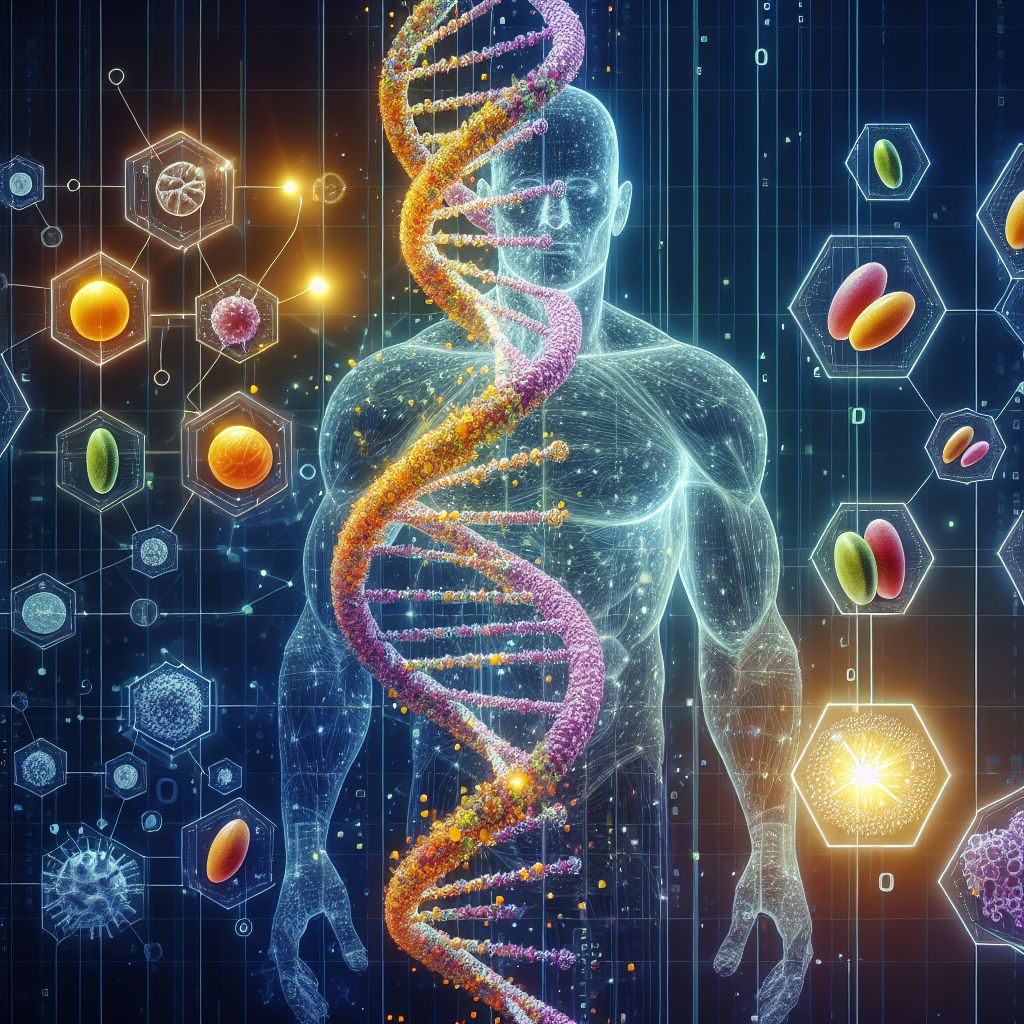Human Design and Vitamins: Personalized Health

Discover your unique Human Design and learn how personalized vitamins can enhance your health. Start your journey towards a healthier you today at Vibrant Vitality.
Exploring the Connection Between Human Design and Vitamin Intake
Human Design, a system that combines astrology, the I Ching, Kabbalah, Hindu-Brahmanic system, and quantum physics, is increasingly being used to understand individuality and personal health. It provides a blueprint of our unique genetic makeup, offering insights into our strengths, weaknesses, and potential health issues. Recently, there has been a growing interest in the connection between Human Design and vitamin intake, with the aim of achieving personalized health.
The Human Design system categorizes individuals into four types: Manifestors, Generators, Projectors, and Reflectors. Each type has a unique way of interacting with the world, and consequently, different nutritional needs. For instance, Manifestors are known for their initiating energy and may require a diet rich in B-vitamins to support their active lifestyle. Generators, on the other hand, have a sustained energy and may benefit from a balanced intake of all essential vitamins to maintain their stamina.
Projectors, who are known for their ability to guide and direct others, may need a higher intake of vitamins that support cognitive function, such as vitamin B12 and D. Reflectors, the rarest type, are highly sensitive to their environment and may require a diet rich in antioxidants, like vitamin C and E, to protect their cells from damage.
The concept of personalized health is not new. However, the integration of Human Design brings a new dimension to it. By understanding our unique design, we can tailor our vitamin intake to support our specific needs. This approach goes beyond the one-size-fits-all model of health, recognizing that each individual has unique nutritional requirements.
Moreover, Human Design can also provide insights into how we metabolize vitamins. For example, some people may have a design that allows them to efficiently absorb and utilize certain vitamins, while others may struggle with the same. This understanding can guide us in choosing the right form of vitamins, whether it’s through food, supplements, or fortified products.
However, it’s important to note that while Human Design can provide valuable insights, it should not replace professional medical advice. It’s always recommended to consult with a healthcare provider before making any significant changes to your diet or vitamin intake.
In conclusion, the connection between Human Design and vitamin intake offers a promising avenue for personalized health. By understanding our unique design, we can tailor our vitamin intake to support our specific needs, potentially improving our overall health and wellbeing. However, more research is needed to fully understand this connection and its implications.
As we continue to explore this fascinating intersection of ancient wisdom and modern science, it’s clear that the future of health is personalized. By integrating systems like Human Design into our health practices, we can move towards a more holistic and individualized approach to wellbeing. This not only empowers us to take charge of our health but also opens up new possibilities for prevention, treatment, and care.
Personalized Health: The Role of Vitamins in Your Human Design

Human Design, a system that combines astrology, the I Ching, Kabbalah, Hindu-Brahmin chakra model, and quantum physics, is increasingly being recognized for its potential in personalized health. This system provides a unique blueprint of our genetic makeup, offering insights into our strengths, weaknesses, and potential health challenges. One of the most intriguing aspects of Human Design is its implications for nutrition, particularly the role of vitamins in supporting our unique physiological needs.
Vitamins are essential nutrients that our bodies need in small amounts to function properly. They play a crucial role in maintaining our health, supporting our immune system, and promoting growth and development. However, not everyone requires the same amount or type of vitamins. This is where Human Design comes into play. By understanding our unique Human Design, we can tailor our vitamin intake to better support our health and wellbeing.
Each of us has a unique Human Design, which is determined by our time, date, and place of birth. This design is represented by a BodyGraph, a visual representation of our genetic makeup. The BodyGraph is divided into nine centers, each representing a different aspect of our being, such as our mind, emotions, communication, and physical health. Each center is associated with specific vitamins and minerals that support its function.
For instance, the Throat Center, which governs communication and expression, is associated with vitamins B and C. These vitamins support the health of our nervous system and immune system, respectively, both of which are crucial for effective communication. Similarly, the Solar Plexus Center, which governs our emotions and intuition, is associated with vitamins A and E. These vitamins support our vision and skin health, respectively, both of which are closely linked to our emotional wellbeing.
By understanding the associations between the centers in our BodyGraph and specific vitamins, we can tailor our vitamin intake to support our unique needs. For instance, if our Throat Center is defined (colored in), it means we have a consistent and reliable way of expressing ourselves. To support this, we might benefit from a higher intake of vitamins B and C. On the other hand, if our Throat Center is undefined (white), it means our communication style is more flexible and adaptable. In this case, we might benefit from a more balanced intake of vitamins.
However, it’s important to note that while Human Design can provide valuable insights into our nutritional needs, it’s not a substitute for professional medical advice. Our vitamin needs can also be influenced by other factors, such as our age, sex, lifestyle, and overall health. Therefore, it’s always recommended to consult with a healthcare professional before making any changes to our diet or vitamin intake.
In conclusion, Human Design offers a fascinating new perspective on personalized health. By understanding our unique design, we can tailor our vitamin intake to better support our health and wellbeing. However, as with any health-related decision, it’s important to seek professional advice and consider all factors before making any changes. As we continue to explore the potential of Human Design in personalized health, it’s exciting to imagine the possibilities for a more tailored approach to nutrition and wellbeing.
Understanding Your Human Design: How Vitamins Contribute to Personalized Health
Human Design is a revolutionary system that combines elements of astrology, the I Ching, Kabbalah, Hindu-Brahmaputra system, and quantum physics to provide a unique and comprehensive blueprint of an individual’s genetic makeup. This blueprint, or ‘design’, can offer profound insights into one’s personality, behaviors, and life purpose. But beyond these psychological and spiritual dimensions, Human Design can also have significant implications for physical health. One of the most intriguing of these is the potential role of vitamins in personalized health, based on one’s unique Human Design.
Vitamins are essential nutrients that our bodies need in small amounts to function properly. They play crucial roles in various physiological processes, from energy production and immune function to bone health and wound healing. However, not everyone requires the same amounts of each vitamin. Factors such as age, sex, lifestyle, and overall health can influence individual vitamin needs. And according to the principles of Human Design, so can one’s genetic blueprint.
The concept of personalized health is not new. It’s a growing field that aims to tailor healthcare and wellness strategies to the individual, based on their unique genetic, environmental, and lifestyle factors. The idea is to move away from a ‘one-size-fits-all’ approach and towards more targeted, effective interventions. In the context of vitamins, this could mean identifying which nutrients one might be more likely to need, or which they might need to avoid, based on their Human Design.
For instance, someone with a particular Human Design might have a higher need for certain vitamins that support energy production, due to their genetic predisposition towards a fast-paced, active lifestyle. Conversely, another person with a different Human Design might require more of the vitamins that support calm and relaxation, due to their predisposition towards a more introspective, contemplative life.
Moreover, Human Design could potentially shed light on how individuals metabolize and absorb vitamins. Some people might have a genetic makeup that allows them to efficiently process certain vitamins, while others might struggle with the same nutrients. This could have significant implications for vitamin supplementation, suggesting that some people might benefit more from certain forms or combinations of vitamins than others.
However, it’s important to note that the field of Human Design is still relatively young, and research into its potential health implications is ongoing. While the idea of personalized vitamin recommendations based on one’s Human Design is compelling, it’s not yet a reality. More studies are needed to validate these theories and to develop reliable, evidence-based guidelines.
In the meantime, it’s always a good idea to consult with a healthcare professional before starting any new vitamin regimen. They can provide personalized advice based on your current health status, lifestyle, and dietary habits. And as our understanding of Human Design continues to evolve, who knows? One day, they might also be able to factor in your unique genetic blueprint.
In conclusion, the intersection of Human Design and vitamins represents an exciting frontier in personalized health. By understanding our unique genetic makeup, we might be able to tailor our vitamin intake more effectively, supporting our health in the most individualized way possible. As we continue to explore this potential, we’re reminded of the incredible complexity and individuality of the human body, and the importance of respecting and nurturing our unique designs.